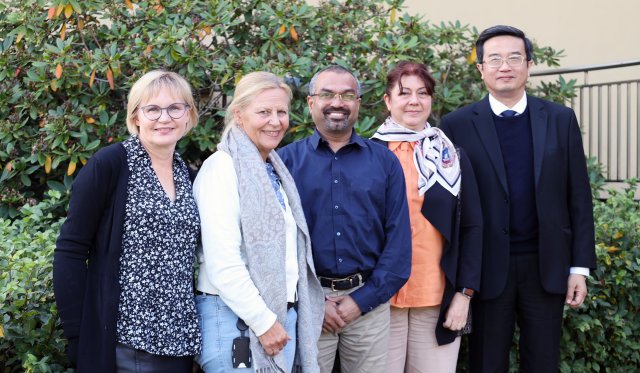Outcomes of the DIVINE project

- Av: Kjersti Busterud
- Publisert: 30. september 2022.
In 2019 a partnership of seven universities was started to collaborate on enhancing the learning and teaching experience for students and staff in social and health sciences. The project was named DVINE, or more specifically “Holistic tools for competence-based curricula to promote Dignity in Vietnam and Nepal”.
The aim of the project was to promote dignity in Vietnam and Nepal through developing holistic tools for competence-based curricula, to improve the physical learning environment in Vietnamese and Nepalese partner institutions, and to enhance teachers’ pedagogical competence in utilizing new teaching methodologies.
Common and different concerns
19.-23. September a workshop was held at VID Oslo, one of the seven project partners. 30 participants from Vietnam, Nepal, Turkey, Finland and Norway joined together for lectures, group discussions and excursions.
During a break, four of the participants gathered at a table to sum up the outcomes of the DVINE project.
- One of the most important aspects of DVINE has been to bring students and teachers from different locations together. We´ve come to recognize what are the common and different concerns in health care practices. But we´ve also learned a lot from each other's professions and how we can cooperate in the future, explains Arja Suikkala, teacher at Diaconia University of Applied Sciences in Finland.
- An important aim of DVINE is how we can work together in a multi-professional way, adds Gülcin Akca, professor at Gazi University in Turkey.
Useful online collaboration
As with many others, the project was affected by Covid-19. But according to the participants, the situation also had some upsides.
- Covid taught us how to cooperate online, says Gülcin Akca.
- Covid was a problem that couldn´t be solved by just one profession. A multitude of professions had to come together and think holistically, just as we´re working on in this project, says Fr. Jiju Varghese S.J, head of SXS Nepal.
One concrete outcome of DVINE is a curriculum of six subjects, that are being taught to students in Nepal and Vietnam. The tuition aims at promoting well-being, health and dignity for people in these countries.
Opens up to new opportunities
The participants also underline the importance of making new friendships, and building a base for future collaboration. A partnership agreement has already been signed between two of the institutions, and “spin-off” projects will probably pop up in the near future.
- When this project is done, we move on to another step, with student and teacher exchange, and further research. This project has opened up for new opportunities, says head of the project at VID Specialized University, Torhild Bjerkreim.
Nguyen Vu Quoc Huy, headmaster at HUMP in Vietnam, summarizes the outcome of the project in four words:
- Holistic approach, comprehensive outcome, he says.
The DVINE project is funded by the Erasmus+ programme: Higher Education – International Capacity Building. The project will conclude with seminars in Nepal and Vietnam in December 2022.